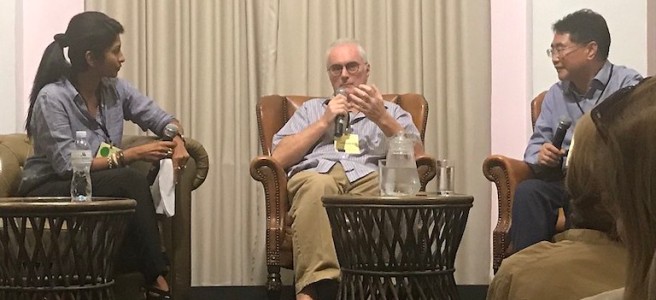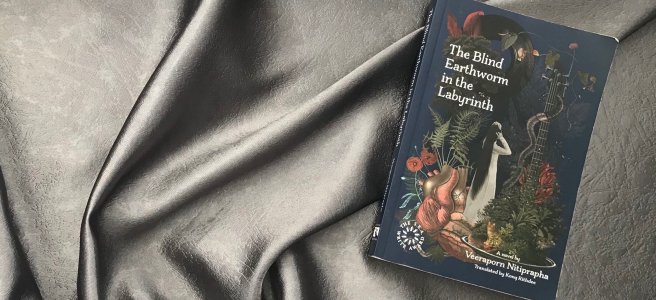Thailand’s first books festival – at least the first that anyone here can remember – happened last weekend. The Bangkok Literature Festival, organised and promoted by the Neilson Hays Library, was a two day event featuring many Thai and overseas writers and translators, with events happening at the library itself and also in a function room at the adjacent British Club.
The main draw was Pitchaya Sudbanthad whose first partly-speculative novel Bangkok Wakes to Rain was heavily promoted; indeed the Sunday evening event was a dinner on the banks of the Chao Praya river with a special reading from his novel by Kuhn Pitchaya. I first came across his novel back in January 2019 in the Philadelphia Barnes & Noble in the US, however a few months ago my copy of that first edition suffered a similar fate to Bangkok in the novel: being submerged under water, when a broken water bottle in my backpack completely soaked the book. At the Festival I was able to buy the UK trade paperback edition as a replacement (and which frankly has a much better cover), and which Kuhn Pitchaya also kindly signed for me.
Another highlight for me was meeting Veeraporn Nitiprapha. After seeing her take part in two panels, I bought a Thai edition of her magnificent novel to give to my wife. She thanked me again for my review (now over at the Thai Literary Supplement) of Kong Rithdee’s superb translation as she was signing and inscribing her book for me. Many people who have read it in English have commented very positively on the translation, Kuhn Veeraporn included, although she obviously feels more attached to the Thai edition. “The translation was not my words. These are my words,” she said as she returned the book to me with a grin.
The first panel discussion I attended (above) was a moderated conversation/interview between John Burdett, English author of the ‘Bangkok Eight’ crime series, and the Chinese-American author of the ‘Inspector Chen’ Shanghai crime series Qiu Xiaolong. The whole exchange was lively and very informative about how these authors go about the business of writing crime. Burdett in particular gave some good background on the riskiness of writing another culture with the distinct possibility of offending the sensibilites of that culture; to illustrate this he mentioned being asked to consider having the series translated into Thai, but was then advised by a Thai publisher “Er, don’t push your luck”. Qiu was a poet before falling into writing the Inspector Chen novels, which it seems almost came about by accident, never having envisaged himself as a crime writer. His successful series has now been translated into Chinese, although the publisher made some odd changes: Shanghai is simply renamed “H City” despite leaving the rest of the text to make it abundantly clear to a Chinese reader that H City is in fact Shanghai.
The other two panel discussions I attended were both about the business of translation, and were both conducted in Thai. An instantaneous English translation was available with use of a radio-linked earphone, but this proved to be a little unreliable as all I could hear for the second half of the first panel was static, which left me lost at sea, but the gist of both panels was that there are too few books in Thai being translated and published overseas – indeed the first Thai fiction ever to be published in England was Prabda Yoon’s collection The Sad Part Was, and that only happened as recently as 2017. My own feelings on this can be summed up by the simple observation that there are too few overseas readers of Thai, and therefore there will be even fewer translators: the great majority of the current translation work is having to be done by Thais fluent in English, which inherently carries a risk of inaccuracies. It is a given that a better and probably more readable translation will likely result if translators are translating into their native tongue rather than from their native tongue. Having said that, I remind myself that the two Thai translators on these panels, Kong Rithdee and Mui Poopoksakul, both produce excellent translations from Thai into English, but the point still stands: far too few overseas readers of Thai are currently working on translations of Thai literature.
There was a nice relaxed ambience to the Festival, with adequate space for everything and a good attendance, and it will be considered a successful start if it’s to happen annually from now on, which I sincerely hope will be the case. The cafe was a good size, and in the outdoor dealers’ area in front of the library entrance a few Thai publishers such as River Books presented a selection for sale, plus Asia Books were also present although their selection of English and Thai books deserved to be bigger.
Book haul:
Pitchaya Sudbanthad, Bangkok Wakes to Rain, 2019
Veeraporn Nitiprapha, ไส้เดือนตาบอดในเขาวงกต, 2013 (June 2015 edition)


